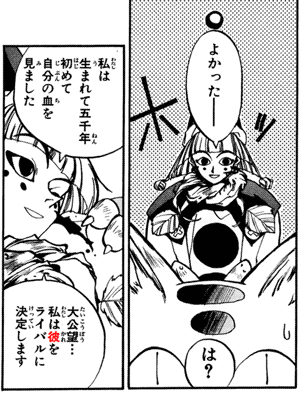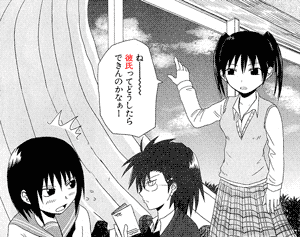In Japanese, kare 彼 means either "he," "him," a male third person pronoun, or "boyfriend," kareshi 彼氏.
It's the male counterpart of kanojo 彼女, "she," "her," "girlfriend."
Third Person Pronoun
The word kare 彼 is a masculine third person pronoun. Its plural form would be:
- kare wa Tarou desu
彼は太郎です
He is Tarou. - kare wo tasukeru
彼を助ける
To help him. - kare-ra
彼ら
He and the others. They. - kare-tachi
彼達 - kare no
彼の
His. - kare-ra no
彼らの
Their.
Theirs.
Japanese is a pro-drop language, so it's not necessary to use kare in some places we'd use "he" in English, if it's implicit whom we're talking about. For example, in the answer for a question:
- Tarou wa nani wo shite-iru?
太郎は何をしている?
What is Tarou doing? - benkyou shite-iru
勉強している
[Tarou] is studying.
[He] is studying.
- kare wa benkyou shite-iru
彼は勉強している
He is studying.
- kare wa benkyou shite-iru
- Context: Shinkouhyou 申公豹 blasts Taikoubou 太公望 with a powerful attack, who retaliates, giving Shinkouyou a little cut in the cheek. Shinkouyou asks his cat to check if Taikoubou survived, and then, after confirming he survived the attack:
- yokatta~
よかったー
[That's a relief]. - ha?
は?
Hah? (the cat doesn't get why he's relieved the guy he was going to kill is still alive.) - watashi wa
umarete go-sen-nen
hajimete
jibun no chi wo
mimashita
私は生まれて五千年初めて自分の血を見ました
In the five thousand years [I] have been born [it] is the first time I've seen [my] own blood. - Taikoubou...
太公望・・・ - watashi wa kare wo
raibaru ni
kettei shimasu
私は彼をライバルに決定します
I've decided that he is [my] rival.
"Boyfriend" in Japanese
The word kare 彼 also means "boyfriend" in Japanese. The word kareshi 彼氏 is sometimes preferred, in order to avoid confusion.
- watashi no kare
私の彼My him.(wrong.)
My boyfriend. (right.) - kare wa iru?
彼はいる?
Is he here? (locative.)
Do [you] have a boyfriend? (possessive.)
- kare wa koko ni iru
彼はここにいる
"He exists here."
He is here. - watashi wa kare ga inai
私は彼がいない
I don't have a boyfriend. - watashi wa {kare ga inai} to ikite-ikenai
私は彼がいないと生きていけない
If {he isn't [around]}, I can't go on living.
I can't go on living if he isn't around.
I can't live without him.
- kare wa koko ni iru
- atarashii kare ga dekita
新しい彼ができた
[I] made a new boyfriend.
- mae no kare
前の彼
The boyfriend of before. (literally.)
[My] previous boyfriend.
Sometimes, the word is spelled with katakana.
- moto-kare
元カレ
Former boyfriend. Ex-boyfriend.
- nee, kareshi tte dou shitara dekin-no ka naaa
ねー 彼氏ってどうしたらできんのかなぁー
Hey, what does [one] have to do to make a boyfriend?- dekin-no - contraction of dekiru no できるの.
Kanji
The kanji of kare 彼 sometimes appears in other words. Its meaning is the same as the a~ あ~ morpheme in kosoado words.
- kono chi
この地
This land. - ano chi
あの地
That land. - kanochi
彼の地
Originally, kare かれ meant the same thing as ano hito あの人, "that person." In old Japanese, kare かれ is synonymous with are あれ, "that," in the sense of that thing, rather than that person.(kobun.weblio.jp)
Some other words:
References
- かれ 【彼】 - kobun.weblio.jp, accessed 2021-04-24.


No comments: